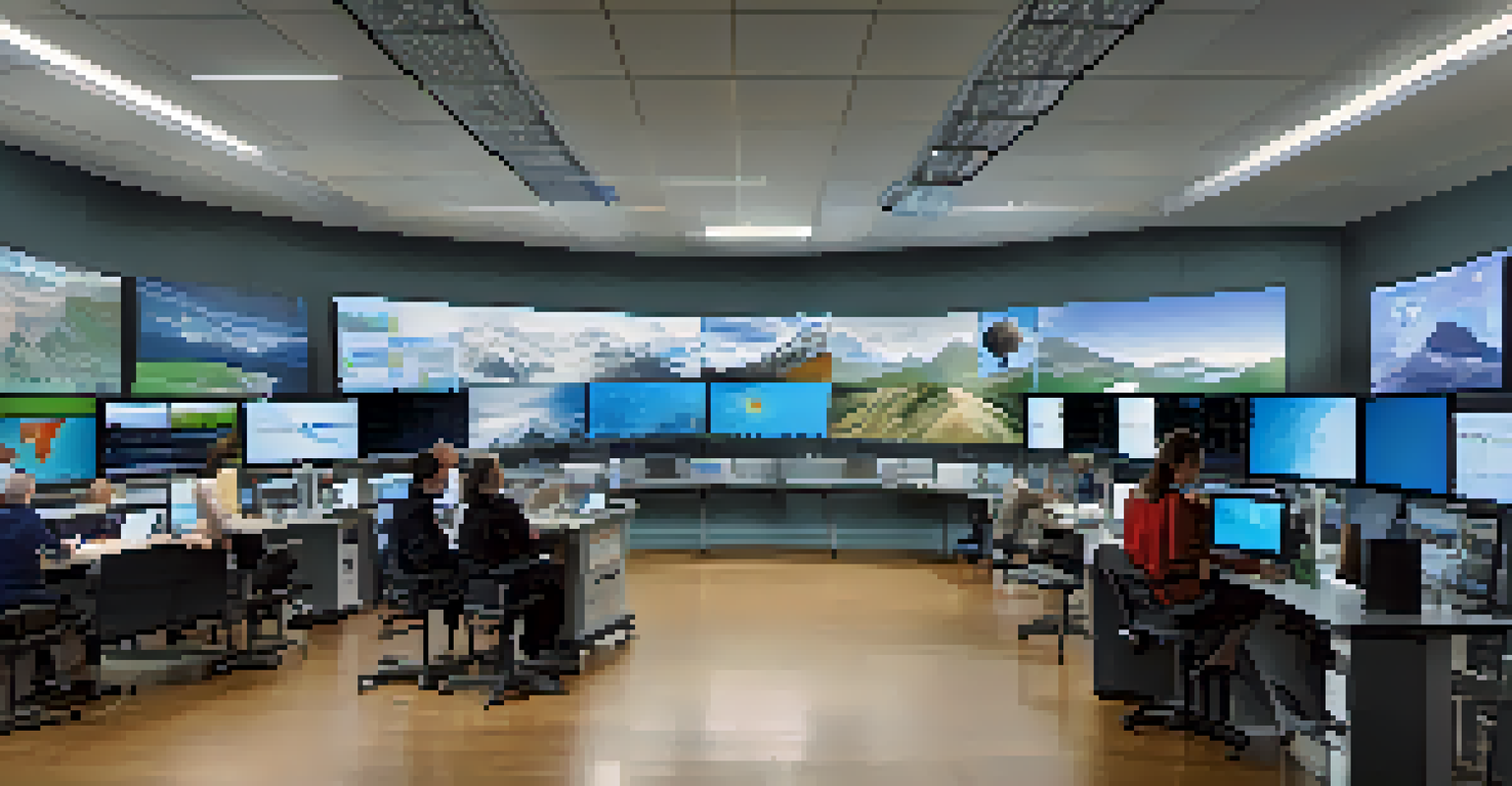Boulder's Research Institutions Leading Climate Data Analysis

Overview of Climate Data Analysis in Boulder
Boulder, Colorado, is home to several renowned research institutions that are at the forefront of climate data analysis. These organizations play a vital role in understanding climate change and its impacts on the environment. With cutting-edge technology and innovative approaches, they are shaping the future of climate science.
Climate change is not a problem for future generations; it is the problem of our own generation. We must be the leaders in finding solutions.
The city's unique geographical location and diverse ecosystems provide an ideal setting for climate research. Here, scientists can gather data from the Rocky Mountains to the plains, enabling them to study various climate phenomena. This rich tapestry of natural resources not only supports research but also attracts experts from around the globe.
By collaborating with universities, governmental agencies, and private organizations, Boulder’s institutions are creating a comprehensive network dedicated to climate research. This synergy enhances the capacity for data collection and analysis, making Boulder a hub for climate science innovation.
Key Institutions Leading the Charge
Among the key players in Boulder’s climate data analysis are the National Oceanic and Atmospheric Administration (NOAA) and the University of Colorado Boulder. These institutions are known for their extensive research programs and commitment to understanding climate variability. Their studies often focus on predictive modeling and real-time data collection, which are crucial for effective climate forecasting.

NOAA, in particular, operates the Earth System Research Laboratory, which specializes in atmospheric research and climate monitoring. This lab conducts groundbreaking studies that help policymakers and communities prepare for climate-related challenges. Meanwhile, the University of Colorado Boulder integrates climate research into its curriculum, fostering a new generation of climate scientists.
Boulder: A Climate Research Hub
Boulder is a leading center for climate data analysis, housing renowned institutions that collaborate to advance climate science.
These institutions not only contribute to scientific knowledge but also engage with the community through outreach programs. By sharing their findings with the public, they raise awareness about climate issues and inspire action at the local level.
Innovative Technologies in Climate Research
Boulder’s research institutions leverage state-of-the-art technologies to enhance climate data analysis. Remote sensing, for example, allows scientists to gather data from satellites, providing a broad view of climate trends across different regions. This technology enables researchers to track changes in land use, vegetation cover, and atmospheric conditions effectively.
The science is clear: We need to act now to reduce carbon pollution and prepare for the impacts of climate change.
Additionally, advanced modeling techniques are employed to simulate climate scenarios and predict future outcomes. These models can assess the impact of human activities on the environment, helping to inform better decision-making. The integration of artificial intelligence and machine learning into these models further improves their accuracy and predictive capabilities.
As these technologies evolve, they open up new possibilities for climate research. Institutions in Boulder continuously adapt and refine their approaches, ensuring they remain at the cutting edge of climate science.
Collaboration Across Disciplines
One of the standout features of Boulder's climate research is the interdisciplinary collaboration that takes place among various fields. Experts in ecology, meteorology, geography, and social sciences come together to tackle complex climate issues. This holistic approach allows for a more comprehensive understanding of how climate change affects different aspects of life.
For instance, researchers may study the impact of rising temperatures on local wildlife while simultaneously examining how these changes affect human communities. This interconnectedness is crucial for developing effective climate adaptation strategies that consider both natural and human systems.
Innovative Technologies Drive Research
State-of-the-art technologies, including remote sensing and AI, enhance the accuracy of climate data analysis in Boulder.
Moreover, these collaborations often extend beyond academia to include governmental and non-profit organizations. By pooling resources and expertise, these groups can implement more effective climate solutions that benefit the entire community.
Case Studies Highlighting Boulder's Impact
Boulder’s institutions have produced numerous case studies that illustrate the significant impact of their climate research. One notable example is a study focused on the effects of wildfires in the region, which analyzed how climate change has intensified fire seasons. The findings not only informed local fire management strategies but also contributed to national wildfire policies.
Another case study examined the effects of climate change on water resources in the Boulder area. By assessing shifting precipitation patterns, researchers provided valuable insights for local water management practices. This type of research is vital as it helps communities prepare for and mitigate the impacts of climate change on essential resources.
These case studies serve as a testament to the practical applications of Boulder's climate research. They demonstrate how scientific findings can lead to tangible benefits for communities, enhancing resilience against climate change.
Community Engagement and Education Efforts
Boulder’s research institutions are deeply committed to community engagement and education regarding climate issues. They host workshops, seminars, and public lectures to share their findings with local residents. This outreach not only informs the community about climate change but also encourages active participation in sustainability initiatives.
Educational programs aimed at schools provide students with hands-on experiences in climate science. By involving young people in research and discussions, these institutions are fostering a culture of environmental stewardship that can last a lifetime. This investment in education is critical for building a more informed and proactive generation.
Community Engagement is Key
Boulder's research institutions actively involve the community through education and outreach, fostering a culture of environmental stewardship.
Furthermore, community-led projects often stem from these educational efforts, allowing residents to apply what they’ve learned. Such projects can range from local tree-planting initiatives to neighborhood clean-up days, all contributing to a more sustainable future.
Looking Ahead: The Future of Climate Research
As climate change continues to pose significant challenges globally, Boulder's research institutions are poised to play an even more critical role in finding solutions. Their ongoing commitment to innovation and interdisciplinary collaboration will be key in tackling emerging climate issues. Moreover, as technology advances, the potential for more precise data collection and analysis will only grow.
Future research is likely to delve deeper into the socio-economic impacts of climate change, exploring how different communities are affected and what adaptive measures can be implemented. This focus on equity will ensure that solutions are inclusive and address the needs of all residents.

Ultimately, Boulder's leading research institutions will continue to inspire and equip both local and global communities to confront the realities of climate change. Their work not only enhances scientific understanding but also empowers individuals to take action for a sustainable future.